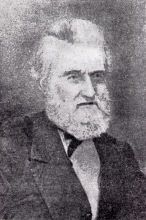Northern-born Southerner Jacob Eliot (1803-1870) of Corsicana, Texas is a successful attorney, a slaveholder, and the church clerk of the Corsicana Baptist Church.
Born in New York in 1803 and raised in Kentucky, Eliot at the age of 46 had moved to Navarro County, Texas, with his wife, children, and grandchildren. Purchasing 3,605 acres, Eliot has lived in Corsicana since.
Of an advanced age and unable to serve in uniform, Eliot assists the Confederate war effort on the home front while making his living farming and working as an attorney. He frequently employees his lawyer services in slave transactions.
During the war Eliot keeps a journal consisting of brief entries which offer glimpses into the life of a financially-secure, hard-working home front white Southerner.
This month’s entries, in addition to a lone February entry, in Eliot’s journal speak of fulfilling obligations to the Confederate government and of his church:
Jan. 13, ’64: — I killed ten hogs today. Total weitht 1700 pounds. We are to send 2000 pounds to the government.
Jan 14, ’64: — Today we salted down the pork in large tubs. It was very difficult to save bacon with the salt made at our Saline.
Jan. 18, Monday: — Today my workers are cutting timber to make barrel. They made and delivered to John Gibson twenty six barrels.
Jan. 21: — I delivered ten barrels of lard to the Government Agent.
Jan. 22: — Workers made ten barrels to put flour in.
Jan. 24, Sunday: — Rev. J. Leake, our pastor of Baptist Church, will serve another year. Salary $100. which was paid today.
Feb. 10: — Col. Riggs called. I paid him 4 1/2 bushels of wheat, 5 bushels of oats. This is my tithe tax for year.
As with many Baptist churches of the South, the congregation calls a pastor on an annual basis. Some pastors serve one church for many years, voted upon each year to do so. In other instances, churches habitually choose a different pastor year over year.
Among Baptist churches of the Confederacy that remain open during the war, pastors’ salaries tend to be meager, increasingly so (at least in terms of monetary value) as the war progresses. Such may be the case with J. Leake of Corsicana Baptist Church: $100 is a pittance compared to the $2,000 cash that Eliot spends in March “to purchase a negro.”
Source: “Jacob Eliot’s Civil War Journal” (link)



